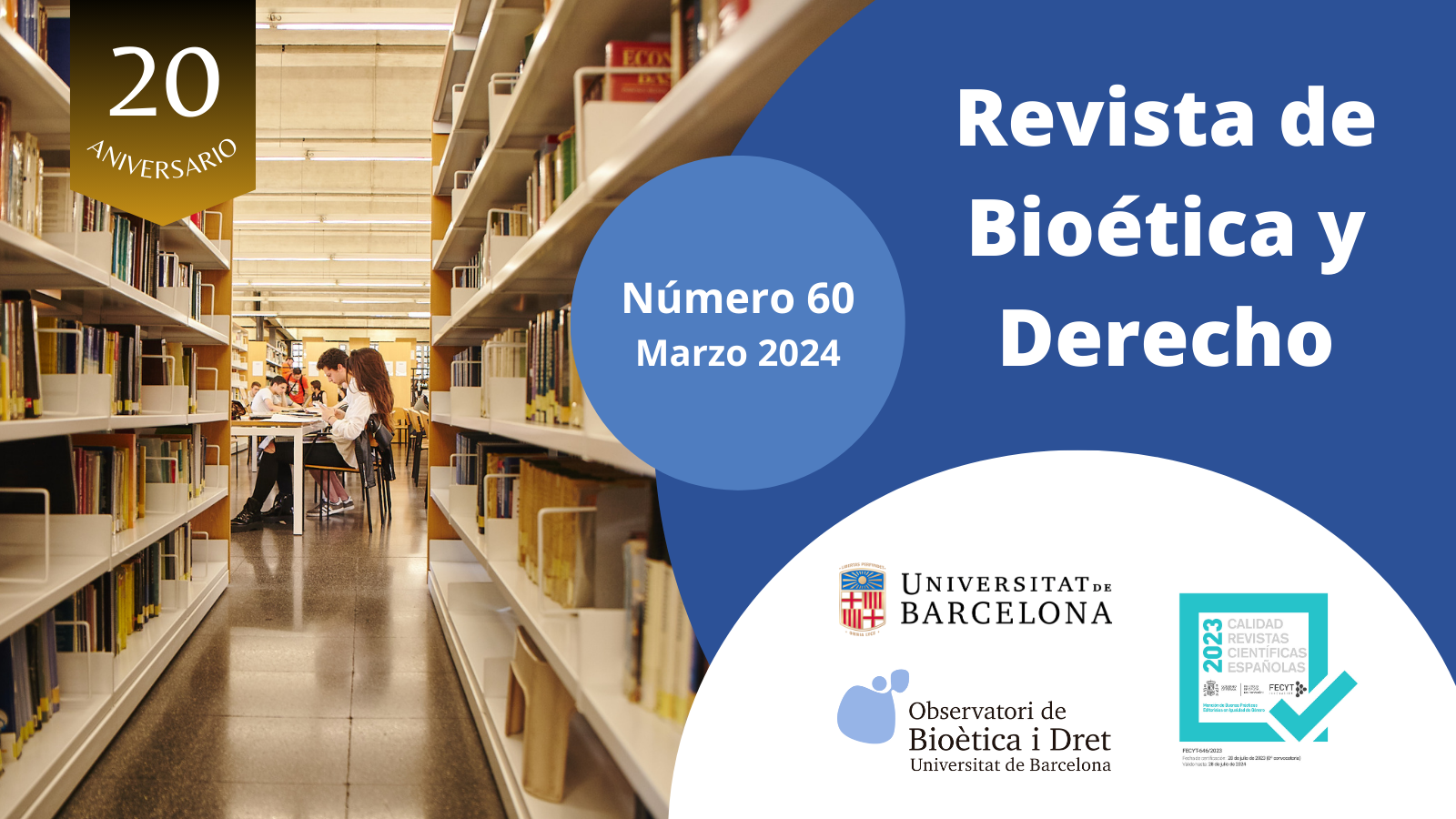The pursuit of happiness in self-help literature. A challenge for bioethics
DOI:
https://doi.org/10.1344/rbd2024.60.43279Keywords:
happiness, bioethics, self-help, responsibility, non maleficienceAbstract
The aim of the present study is to analyze the possible risks associated with the consumption of self-help books, in which people are constantly looking for instant solutions to everyday life problems. The research is framed in the theoretical article methodology. A literature search was conducted in scientific and humanities databases, in addition to considering the background and context related to the proposed topic, followed by an analysis of the information. Results showed that the use of self-help as a method to solve problems affecting the contemporary subject in society has risks, due to the possibility of transgressing the principles of bioethics, and the failure to implement the foundations provided by neuroscience on the scope of happiness.
References
Sagan, C. (1998). El mundo y sus demonios: la ciencia como una luz en la oscuridad.
Punset, E. (2010). El viaje a la felicidad. Grupo Planeta Spain.
Harari, Y. N. (2014). Sapiens: A Brief History of Humankind. Random House.
Murugappan, G., Alvero, R., Lyell, D. J., Khandelwal, A., & Leonard, S. A. (2021).Development and validation of a risk prediction index for severe maternal morbidity based on preconception comorbidities among infertile patients. Fertility and Sterility, 116(5), 1372-1380. https://doi.org/10.1016/j.fertnstert.2021.06.024.
Niro, M., & Manes, F. (2021). Ser humanos: Todo lo que necesitas saber sobre el cerebro. Ediciones Paidós.
Siurana, J. C. (2018). Felicidad a golpe de autoayuda: tu vida en manos de un best seller.
Smiles, S. (1859). Self-help: With Illustrations of Character and Conduct.
Manrique, R.G. (2009). Qué hay de malo en ser perfecto. RBD. Revista de Bioética y Derecho, 15, 26-30. http://doi.org/10.1344/rbd2009.15.7789.
Alvarado, L. X. B., Guadalima, N. G., & Álvarez, P. S. Á. P. S. (2020). El imperativo de la felicidad en la literatura de autoayuda. la cosificación del sujeto moderno. Revista question. https://doi.org/10.24215/16696581e241.
Nietzsche, F. (2001). La gaya ciencia. Ediciones AKAL.
Foucault, M. (2010). Historia de la sexualidad.
Raposo, G. (2015). Manual de psicología y autoayuda: «Eres Amor y Posibilidades Infinitas».
Boito, M. E. (2016). Garantías de felicidad. Estudio sobre los libros de autoayuda (Vanina Papalini). Revista Latinoamericana comunicación chasqui. https://doi.org/10.16921/chasqui.v0i133.29982.
Sádaba, J. (2009). La felicidad y el cuerpo humano. DOAJ (DOAJ: Directory of Open Access Journals). https://doi.org/10.1344/rbd2008.12.7820.
Freud, S. (2022). El malestar en la cultura: Freud. Lebooks Editora.
Romero, P. D. (2022). Sobre el reconocimiento de la enfermedad como experiencia subjetiva y su impacto en la salud pública. Revista de bioética y derecho. https://doi.org/10.1344/rbd2022.55.32562.
Cabanas, E., & Illouz, E. (2019). HappyCracia: Cómo la ciencia y la industria de la felicidad controlan nuestras vidas. Ediciones Paidós.
Villaplana, Á. C. (2015). Derechos humanos, emociones y neuroética. Revista Humanidades, 5(2), 1-27. https://doi.org/10.15517/h.v5i2.21213.
Evers, K. (2011). Neuroética. cuando la materia se despierta. Katz Editores.
Kahneman, D. (2014). Pensar rápido, pensar despacio / thinking, fast and slow. National Geographic Books.
Bauman, Z. (2015). Modernidad líquida. Fondo de Cultura Economica.
Sennett, R. (2000). La corrosión del carácter: las consecuencias personales del trabajo en el nuevo capitalismo.
Luna, F. (2009). La bioética y la crítica al «statu quo». DOAJ (DOAJ: Directory of Open Access Journals). https://doi.org/10.1344/rbd2007.10.7845.
Ibargüen, M. A. (2010). Topologías y marcos significativos en Zygmunt Bauman. Boletín de Antropología, 23(40), 315-351. https://doi.org/10.17533/udea.boan.6486.
Sennett, R. (2009). El artesano. Anagrama.
Séneca. (2014). Sobre la felicidad. FV Éditions.
Sotelo, R. N. G., Centeno, J. E. O., Pérez, M. H. J., & Ramirez-Garcia, S. A. (2023). Bioética en contextos pluriculturales: problemas epistemológicos y su relación con los derechos humanos. Revista de bioética y derecho, 5-24. https://doi.org/10.1344/rbd2023.58.39782.
Camps, V. (1990). Virtudes públicas.
Cortina, A. (2020). Ética mínima: introducción a la filosofía práctica.
Gracia, D. (2008). Fundamentos de bioética.
Sartre, J. (1999). El existencialismo es un humanismo.
Nietzche, F. (2017). La genealogia de la moral. Epoca.
Downloads
Published
How to Cite
Issue
Section
License
Copyright (c) 2023 Federico Vásquez Cardona, Daniel Valencia Cartagena, José Arroyave Carvajal

This work is licensed under a Creative Commons Attribution-NonCommercial-NoDerivatives 4.0 International License.
 The author retains the copyright and grants Revista de Bioética y Derecho the right of first publication of the article. All articles published in Revista de Bioética y Derecho are under Creative Commons licensing Recognition – Non Commercial – NoDerivedArtwork (by-nc-nd 4.0), which allows sharing the content with third parties, provided that they acknowledge its authorship, initial publication in this journal and the terms of the license. No commercial use of the original work or generation of derivative works is permitted.
The author retains the copyright and grants Revista de Bioética y Derecho the right of first publication of the article. All articles published in Revista de Bioética y Derecho are under Creative Commons licensing Recognition – Non Commercial – NoDerivedArtwork (by-nc-nd 4.0), which allows sharing the content with third parties, provided that they acknowledge its authorship, initial publication in this journal and the terms of the license. No commercial use of the original work or generation of derivative works is permitted.







